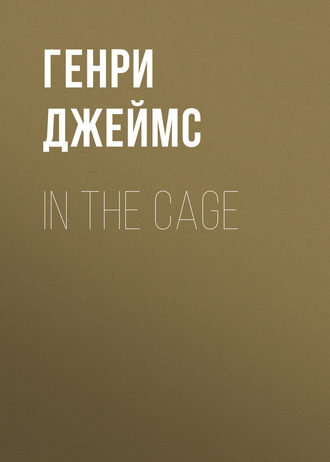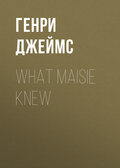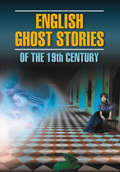
Генри Джеймс
In the Cage
CHAPTER IX
Meanwhile, since irritation sometimes relieved her, the betrothed of Mr. Mudge found herself indebted to that admirer for amounts of it perfectly proportioned to her fidelity. She always walked with him on Sundays, usually in the Regent’s Park, and quite often, once or twice a month he took her, in the Strand or thereabouts, to see a piece that was having a run. The productions he always preferred were the really good ones—Shakespeare, Thompson or some funny American thing; which, as it also happened that she hated vulgar plays, gave him ground for what was almost the fondest of his approaches, the theory that their tastes were, blissfully, just the same. He was for ever reminding her of that, rejoicing over it and being affectionate and wise about it. There were times when she wondered how in the world she could “put up with” him, how she could put up with any man so smugly unconscious of the immensity of her difference. It was just for this difference that, if she was to be liked at all, she wanted to be liked, and if that was not the source of Mr. Mudge’s admiration, she asked herself what on earth could be? She was not different only at one point, she was different all round; unless perhaps indeed in being practically human, which her mind just barely recognised that he also was. She would have made tremendous concessions in other quarters: there was no limit for instance to those she would have made to Captain Everard; but what I have named was the most she was prepared to do for Mr. Mudge. It was because he was different that, in the oddest way, she liked as well as deplored him; which was after all a proof that the disparity, should they frankly recognise it, wouldn’t necessarily be fatal. She felt that, oleaginous—too oleaginous—as he was, he was somehow comparatively primitive: she had once, during the portion of his time at Cocker’s that had overlapped her own, seen him collar a drunken soldier, a big violent man who, having come in with a mate to get a postal-order cashed, had made a grab at the money before his friend could reach it and had so determined, among the hams and cheeses and the lodgers from Thrupp’s, immediate and alarming reprisals, a scene of scandal and consternation. Mr. Buckton and the counter-clerk had crouched within the cage, but Mr. Mudge had, with a very quiet but very quick step round the counter, an air of masterful authority she shouldn’t soon forget, triumphantly interposed in the scrimmage, parted the combatants and shaken the delinquent in his skin. She had been proud of him at that moment, and had felt that if their affair had not already been settled the neatness of his execution would have left her without resistance.
Their affair had been settled by other things: by the evident sincerity of his passion and by the sense that his high white apron resembled a front of many floors. It had gone a great way with her that he would build up a business to his chin, which he carried quite in the air. This could only be a question of time; he would have all Piccadilly in the pen behind his ear. That was a merit in itself for a girl who had known what she had known. There were hours at which she even found him good-looking, though, frankly there could be no crown for her effort to imagine on the part of the tailor or the barber some such treatment of his appearance as would make him resemble even remotely a man of the world. His very beauty was the beauty of a grocer, and the finest future would offer it none too much room consistently to develop. She had engaged herself in short to the perfection of a type, and almost anything square and smooth and whole had its weight for a person still conscious herself of being a mere bruised fragment of wreckage. But it contributed hugely at present to carry on the two parallel lines of her experience in the cage and her experience out of it. After keeping quiet for some time about this opposition she suddenly—one Sunday afternoon on a penny chair in the Regent’s Park—broke, for him, capriciously, bewilderingly, into an intimation of what it came to. He had naturally pressed more and more on the point of her again placing herself where he could see her hourly, and for her to recognise that she had as yet given him no sane reason for delay he had small need to describe himself as unable to make out what she was up to. As if, with her absurd bad reasons, she could have begun to tell him! Sometimes she thought it would be amusing to let him have them full in the face, for she felt she should die of him unless she once in a while stupefied him; and sometimes she thought it would be disgusting and perhaps even fatal. She liked him, however, to think her silly, for that gave her the margin which at the best she would always require; and the only difficulty about this was that he hadn’t enough imagination to oblige her. It produced none the less something of the desired effect—to leave him simply wondering why, over the matter of their reunion, she didn’t yield to his arguments. Then at last, simply as if by accident and out of mere boredom on a day that was rather flat, she preposterously produced her own. “Well, wait a bit. Where I am I still see things.” And she talked to him even worse, if possible, than she had talked to Jordan.
Little by little, to her own stupefaction, she caught that he was trying to take it as she meant it and that he was neither astonished nor angry. Oh the British tradesman—this gave her an idea of his resources! Mr. Mudge would be angry only with a person who, like the drunken soldier in the shop, should have an unfavourable effect on business. He seemed positively to enter, for the time and without the faintest flash of irony or ripple of laughter, into the whimsical grounds of her enjoyment of Cocker’s custom, and instantly to be casting up whatever it might, as Mrs. Jordan had said, lead to. What he had in mind was not of course what Mrs. Jordan had had: it was obviously not a source of speculation with him that his sweetheart might pick up a husband. She could see perfectly that this was not for a moment even what he supposed she herself dreamed of. What she had done was simply to give his sensibility another push into the dim vast of trade. In that direction it was all alert, and she had whisked before it the mild fragrance of a “connexion.” That was the most he could see in any account of her keeping in, on whatever roundabout lines, with the gentry; and when, getting to the bottom of this, she quickly proceeded to show him the kind of eye she turned on such people and to give him a sketch of what that eye discovered, she reduced him to the particular prostration in which he could still be amusing to her.
CHAPTER X
“They’re the most awful wretches, I assure you—the lot all about there.”
“Then why do you want to stay among them?”
“My dear man, just because they are. It makes me hate them so.”
“Hate them? I thought you liked them.”
“Don’t be stupid. What I ‘like’ is just to loathe them. You wouldn’t believe what passes before my eyes.”
“Then why have you never told me? You didn’t mention anything before I left.”
“Oh I hadn’t got round to it then. It’s the sort of thing you don’t believe at first; you have to look round you a bit and then you understand. You work into it more and more. Besides,” the girl went on, “this is the time of the year when the worst lot come up. They’re simply packed together in those smart streets. Talk of the numbers of the poor! What I can vouch for is the numbers of the rich! There are new ones every day, and they seem to get richer and richer. Oh, they do come up!” she cried, imitating for her private recreation—she was sure it wouldn’t reach Mr. Mudge—the low intonation of the counter-clerk.
“And where do they come from?” her companion candidly enquired.
She had to think a moment; then she found something. “From the ‘spring meetings.’ They bet tremendously.”
“Well, they bet enough at Chalk Farm, if that’s all.”
“It isn’t all. It isn’t a millionth part!” she replied with some sharpness. “It’s immense fun”—she had to tantalise him. Then as she had heard Mrs. Jordan say, and as the ladies at Cocker’s even sometimes wired, “It’s quite too dreadful!” She could fully feel how it was Mr. Mudge’s propriety, which was extreme—he had a horror of coarseness and attended a Wesleyan chapel—that prevented his asking for details. But she gave him some of the more innocuous in spite of himself, especially putting before him how, at Simpkin’s and Ladle’s, they all made the money fly. That was indeed what he liked to hear: the connexion was not direct, but one was somehow more in the right place where the money was flying than where it was simply and meagrely nesting. The air felt that stir, he had to acknowledge, much less at Chalk Farm than in the district in which his beloved so oddly enjoyed her footing. She gave him, she could see, a restless sense that these might be familiarities not to be sacrificed; germs, possibilities, faint foreshowings—heaven knew what—of the initiation it would prove profitable to have arrived at when in the fulness of time he should have his own shop in some such paradise. What really touched him—that was discernible—was that she could feed him with so much mere vividness of reminder, keep before him, as by the play of a fan, the very wind of the swift bank-notes and the charm of the existence of a class that Providence had raised up to be the blessing of grocers. He liked to think that the class was there, that it was always there, and that she contributed in her slight but appreciable degree to keep it up to the mark. He couldn’t have formulated his theory of the matter, but the exuberance of the aristocracy was the advantage of trade, and everything was knit together in a richness of pattern that it was good to follow with one’s finger-tips. It was a comfort to him to be thus assured that there were no symptoms of a drop. What did the sounder, as she called it, nimbly worked, do but keep the ball going?
What it came to therefore for Mr. Mudge was that all enjoyments were, as might be said, inter-related, and that the more people had the more they wanted to have. The more flirtations, as he might roughly express it, the more cheese and pickles. He had even in his own small way been dimly struck with the linkèd sweetness connecting the tender passion with cheap champagne, or perhaps the other way round. What he would have liked to say had he been able to work out his thought to the end was: “I see, I see. Lash them up then, lead them on, keep them going: some of it can’t help, some time, coming our way.” Yet he was troubled by the suspicion of subtleties on his companion’s part that spoiled the straight view. He couldn’t understand people’s hating what they liked or liking what they hated; above all it hurt him somewhere—for he had his private delicacies—to see anything but money made out of his betters. To be too enquiring, or in any other way too free, at the expense of the gentry was vaguely wrong; the only thing that was distinctly right was to be prosperous at any price. Wasn’t it just because they were up there aloft that they were lucrative? He concluded at any rate by saying to his young friend: “If it’s improper for you to remain at Cocker’s, then that falls in exactly with the other reasons I’ve put before you for your removal.”
“Improper?”—her smile became a prolonged boldness. “My dear boy, there’s no one like you!”
“I dare say,” he laughed; “but that doesn’t help the question.”
“Well,” she returned, “I can’t give up my friends. I’m making even more than Mrs. Jordan.”
Mr. Mudge considered. “How much is she making?”
“Oh you dear donkey!”—and, regardless of all the Regent’s Park, she patted his cheek. This was the sort of moment at which she was absolutely tempted to tell him that she liked to be near Park Chambers. There was a fascination in the idea of seeing if, on a mention of Captain Everard, he wouldn’t do what she thought he might; wouldn’t weigh against the obvious objection the still more obvious advantage. The advantage of course could only strike him at the best as rather fantastic; but it was always to the good to keep hold when you had hold, and such an attitude would also after all involve a high tribute to her fidelity. Of one thing she absolutely never doubted: Mr. Mudge believed in her with a belief—! She believed in herself too, for that matter: if there was a thing in the world no one could charge her with it was being the kind of low barmaid person who rinsed tumblers and bandied slang. But she forbore as yet to speak; she had not spoken even to Mrs. Jordan; and the hush that on her lips surrounded the Captain’s name maintained itself as a kind of symbol of the success that, up to this time, had attended something or other—she couldn’t have said what—that she humoured herself with calling, without words, her relation with him.
CHAPTER XI
She would have admitted indeed that it consisted of little more than the fact that his absences, however frequent and however long, always ended with his turning up again. It was nobody’s business in the world but her own if that fact continued to be enough for her. It was of course not enough just in itself; what it had taken on to make it so was the extraordinary possession of the elements of his life that memory and attention had at last given her. There came a day when this possession on the girl’s part actually seemed to enjoy between them, while their eyes met, a tacit recognition that was half a joke and half a deep solemnity. He bade her good morning always now; he often quite raised his hat to her. He passed a remark when there was time or room, and once she went so far as to say to him that she hadn’t seen him for “ages.” “Ages” was the word she consciously and carefully, though a trifle tremulously used; “ages” was exactly what she meant. To this he replied in terms doubtless less anxiously selected, but perhaps on that account not the less remarkable, “Oh yes, hasn’t it been awfully wet?” That was a specimen of their give and take; it fed her fancy that no form of intercourse so transcendent and distilled had ever been established on earth. Everything, so far as they chose to consider it so, might mean almost anything. The want of margin in the cage, when he peeped through the bars, wholly ceased to be appreciable. It was a drawback only in superficial commerce. With Captain Everard she had simply the margin of the universe. It may be imagined therefore how their unuttered reference to all she knew about him could in this immensity play at its ease. Every time he handed in a telegram it was an addition to her knowledge: what did his constant smile mean to mark if it didn’t mean to mark that? He never came into the place without saying to her in this manner: “Oh yes, you have me by this time so completely at your mercy that it doesn’t in the least matter what I give you now. You’ve become a comfort, I assure you!”
She had only two torments; the greatest of which was that she couldn’t, not even once or twice, touch with him on some individual fact. She would have given anything to have been able to allude to one of his friends by name, to one of his engagements by date, to one of his difficulties by the solution. She would have given almost as much for just the right chance—it would have to be tremendously right—to show him in some sharp sweet way that she had perfectly penetrated the greatest of these last and now lived with it in a kind of heroism of sympathy. He was in love with a woman to whom, and to any view of whom, a lady-telegraphist, and especially one who passed a life among hams and cheeses, was as the sand on the floor; and what her dreams desired was the possibility of its somehow coming to him that her own interest in him could take a pure and noble account of such an infatuation and even of such an impropriety. As yet, however, she could only rub along with the hope that an accident, sooner or later, might give her a lift toward popping out with something that would surprise and perhaps even, some fine day, assist him. What could people mean moreover—cheaply sarcastic people—by not feeling all that could be got out of the weather? She felt it all, and seemed literally to feel it most when she went quite wrong, speaking of the stuffy days as cold, of the cold ones as stuffy, and betraying how little she knew, in her cage, of whether it was foul or fair. It was for that matter always stuffy at Cocker’s, and she finally settled down to the safe proposition that the outside element was “changeable.” Anything seemed true that made him so radiantly assent.
This indeed is a small specimen of her cultivation of insidious ways of making things easy for him—ways to which of course she couldn’t be at all sure he did real justice. Real justice was not of this world: she had had too often to come back to that; yet, strangely, happiness was, and her traps had to be set for it in a manner to keep them unperceived by Mr. Buckton and the counter-clerk. The most she could hope for apart from the question, which constantly flickered up and died down, of the divine chance of his consciously liking her, would be that, without analysing it, he should arrive at a vague sense that Cocker’s was—well, attractive; easier, smoother, sociably brighter, slightly more picturesque, in short more propitious in general to his little affairs, than any other establishment just thereabouts. She was quite aware that they couldn’t be, in so huddled a hole, particularly quick; but she found her account in the slowness—she certainly could bear it if he could. The great pang was that just thereabouts post-offices were so awfully thick. She was always seeing him in imagination in other places and with other girls. But she would defy any other girl to follow him as she followed. And though they weren’t, for so many reasons, quick at Cocker’s, she could hurry for him when, through an intimation light as air, she gathered that he was pressed.
When hurry was, better still, impossible, it was because of the pleasantest thing of all, the particular element of their contact—she would have called it their friendship—that consisted of an almost humorous treatment of the look of some of his words. They would never perhaps have grown half so intimate if he had not, by the blessing of heaven, formed some of his letters with a queerness—! It was positive that the queerness could scarce have been greater if he had practised it for the very purpose of bringing their heads together over it as far as was possible to heads on different sides of a wire fence. It had taken her truly but once or twice to master these tricks, but, at the cost of striking him perhaps as stupid, she could still challenge them when circumstances favoured. The great circumstance that favoured was that she sometimes actually believed he knew she only feigned perplexity. If he knew it therefore he tolerated it; if he tolerated it he came back; and if he came back he liked her. This was her seventh heaven; and she didn’t ask much of his liking—she only asked of it to reach the point of his not going away because of her own. He had at times to be away for weeks; he had to lead lets life; he had to travel—there were places to which he was constantly wiring for “rooms”: all this she granted him, forgave him; in fact, in the long run, literally blessed and thanked him for. If he had to lead his life, that precisely fostered his leading it so much by telegraph: therefore the benediction was to come in when he could. That was all she asked—that he shouldn’t wholly deprive her.
Sometimes she almost felt that he couldn’t have deprived her even had he been minded, by reason of the web of revelation that was woven between them. She quite thrilled herself with thinking what, with such a lot of material, a bad girl would do. It would be a scene better than many in her ha’penny novels, this going to him in the dusk of evening at Park Chambers and letting him at last have it. “I know too much about a certain person now not to put it to you—excuse my being so lurid—that it’s quite worth your while to buy me off. Come, therefore; buy me!” There was a point indeed at which such flights had to drop again—the point of an unreadiness to name, when it came to that, the purchasing medium. It wouldn’t certainly be anything so gross as money, and the matter accordingly remained rather vague, all the more that she was not a bad girl. It wasn’t for any such reason as might have aggravated a mere minx that she often hoped he would again bring Cissy. The difficulty of this, however, was constantly present to her, for the kind of communion to which Cocker’s so richly ministered rested on the fact that Cissy and he were so often in different places. She knew by this time all the places—Suchbury, Monkhouse, Whiteroy, Finches—and even how the parties on these occasions were composed; but her subtlety found ways to make her knowledge fairly protect and promote their keeping, as she had heard Mrs. Jordan say, in touch. So, when he actually sometimes smiled as if he really felt the awkwardness of giving her again one of the same old addresses, all her being went out in the desire—which her face must have expressed—that he should recognise her forbearance to criticise as one of the finest tenderest sacrifices a woman had ever made for love.







